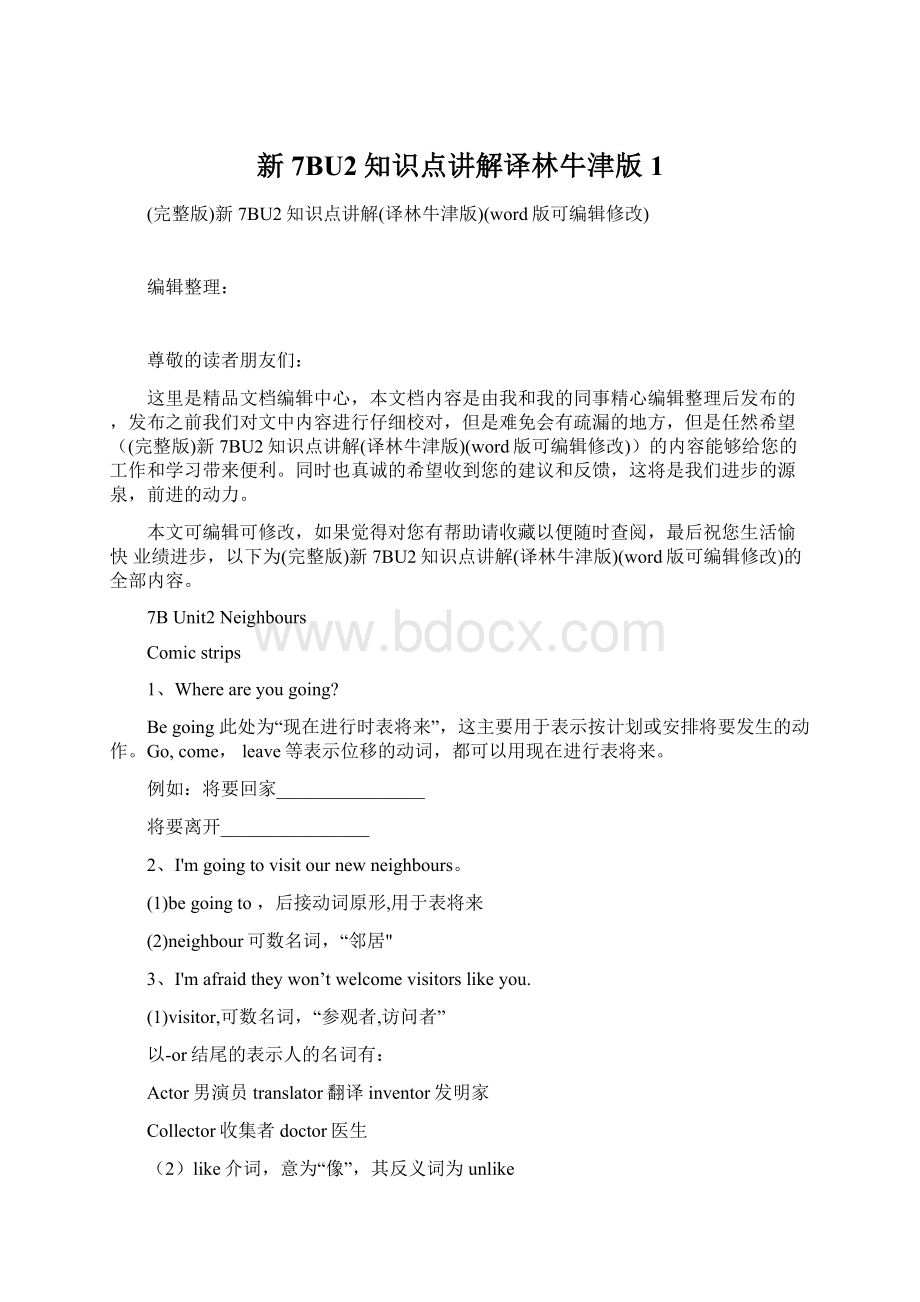新7BU2知识点讲解译林牛津版1.docx
《新7BU2知识点讲解译林牛津版1.docx》由会员分享,可在线阅读,更多相关《新7BU2知识点讲解译林牛津版1.docx(9页珍藏版)》请在冰豆网上搜索。

新7BU2知识点讲解译林牛津版1
(完整版)新7BU2知识点讲解(译林牛津版)(word版可编辑修改)
编辑整理:
尊敬的读者朋友们:
这里是精品文档编辑中心,本文档内容是由我和我的同事精心编辑整理后发布的,发布之前我们对文中内容进行仔细校对,但是难免会有疏漏的地方,但是任然希望((完整版)新7BU2知识点讲解(译林牛津版)(word版可编辑修改))的内容能够给您的工作和学习带来便利。
同时也真诚的希望收到您的建议和反馈,这将是我们进步的源泉,前进的动力。
本文可编辑可修改,如果觉得对您有帮助请收藏以便随时查阅,最后祝您生活愉快业绩进步,以下为(完整版)新7BU2知识点讲解(译林牛津版)(word版可编辑修改)的全部内容。
7BUnit2Neighbours
Comicstrips
1、Whereareyougoing?
Begoing此处为“现在进行时表将来”,这主要用于表示按计划或安排将要发生的动作。
Go,come,leave等表示位移的动词,都可以用现在进行表将来。
例如:
将要回家________________
将要离开________________
2、I'mgoingtovisitournewneighbours。
(1)begoingto,后接动词原形,用于表将来
(2)neighbour可数名词,“邻居"
3、I'mafraidtheywon’twelcomevisitorslikeyou.
(1)visitor,可数名词,“参观者,访问者”
以-or结尾的表示人的名词有:
Actor男演员translator翻译inventor发明家
Collector收集者doctor医生
(2)like介词,意为“像”,其反义词为unlike
相关短语:
belikelooklike
Welcometotheunit
1、waiterwaitress均可数名词
2、Howmanybuildingsarethereinyourneighbourhood?
neighbourhood为不可数名词,“街区,居民区”
常用短语:
intheneighbourhood在街区
intheneighbourhoodof“大约,左右”
3、Mostofthemhave14floors。
Mostof表示“……中的大多数”,后接可数名词复数作主语时,谓语动词用复数形式;
也可接不可数名词,此时谓语动词用单数形式。
Eg:
大多数男孩喜欢足球。
____________________________________________________
大部分水是干净的.____________________________________________________
4、Whatdoyouhavearoundyourneighbourhood?
around为介词,“在……的周围”;也可作副词,“在周围,到处”。
Eg:
他住在伦敦周围。
____________________________________________________
我们围着桌子坐。
____________________________________________________
5、They’rekindandhelpful.
Helpful为形容词,“愿意帮忙的,有用的”
短语:
behelpfultosb.“对某人很有帮助”
Reading
1、Isthereacommunitycentreinyourneighbourhood?
Community可数名词,“社区,社团",此处为名次作定语。
Community作主语时,谓语动词可用单数或复数形式。
Eg:
我们的社区很大。
____________________________________________________
我们社团(的人)打算去游长城.____________________________________________________
2、Therearesomesocialworkers.
Social形容词,“社会的"
常见短语:
socialworker“社会工作者”socialproblem“社会问题"
3、Theyhelpuswithallkindsofproblems。
(1)helpsb.Withsth。
“帮助某人某事”
【拓展】与help有关的固定短语:
Helpsb.(to)dosth.帮助某人做某事
Beofsome/no/muchhelptosb。
对某人有些/没有/很有帮助
Helponeself(to)自用(食物等)
Helpsb。
out帮助某人客服困难、解决问题、完成工作等
Withthehelpof在……的帮助下
Helptodosth.有助于做某事
(2)allkindsof各种各样的
【拓展】
·kind名词,“种类",同义词:
sort~hats各种各样的帽子
·kind形容词,“亲切的,仁慈的”bekindto…对……好
4、There’ssomethingwrongwithmycomputer.
(1)句型Thereissomethingwrongwithsth.意为“某物坏了”,相当于Somethingisn’tworkingwell,还可以用Somethingisbroken.替换。
Eg:
我的手表坏了。
____________________________________________________
【拓展】:
Thereisnothingwrongwithsth.某物没有坏。
Isthereanythingwrongwithsth.?
某物有没有出问题?
(2)something不定代词,意为“某事,某物”,多用于肯定句中.在疑问句中常用anything.在否定句中常用nothing。
作主语时谓语动词用单数形式。
Eg:
Somethinghappens.有事发生了。
注意:
在疑问句中,当说话人希望得到肯定答复时,也可以用something。
Eg:
DoyouhavesomethingthatIcanuse?
5、I’mgoingtoaskacomputerengineertocheckit。
(1)engineer可数名词,意为“工程师",其前不定冠词用an。
(2)Check及物动词,意为“检查,核实”
与check有关的短语:
checkin登记;检票checkout结账退房checkup检验
6、MycousinAnnie’sbicycleisbroken。
Broken形容词,“弄坏了的;伤残的”,可位于名词前作定语或系动词前作表语。
Eg:
这台电视机坏了。
____________________________________________________
你能看见那个破的窗子吗?
____________________________________________________
【拓展】broken还有“骨折的;零碎的;不连贯的”意思
7、…soshe’sgoingtoasksomeonetofixit.……所以她打算找人修一修.
(1)someone不定代词,意为“某人”,用作单数,与somebody用法相同。
Eg:
有人想见你。
____________________________________________________
(2)fix及物动词,意为“修理;安装”
【辨析】fix与mend
Fix修理,表示使得受到一定损坏或失灵的东西恢复其性能或机能,其对象范围很广,从道路、机器到日常用品。
Mend修补,表示修补破损的东西,使其恢复原样,一般指较小的物品。
【拓展】fixup意为“修理;安装"
Eg:
你的自行车坏了,让我们修一修吧。
____________________________________________________
8、Canyoufindanyonetohelpyouwithyourhomework?
anyone为不定代词,意为“任何人”,相当于anybody.常用于疑问句或否定句中,肯定句中用somebody或someone.
Eg:
有人来过吗?
____________________________________________________
【辨析】anyone与anyone
anyone用作代词,只能指人,意为“任何人,有人”,不能与of短语连用
anyone既可以指人,也可以指物,意为“任何一个人或任何一个物”,强调只限一个,可以和of短语连用,表示多数之中的任何一个
Eg:
家里有人吗?
_____________________________________________________________
你可以从这些当中选择任何一个。
________________________________________________
9、Somecollegestudentsarereadytohelp。
(1)college可数名词,意为“学院"
相关拓展短语:
Beincollege正在上大学gotocollege上大学
(2)bereadytodosth.“准备做某事”
Eg:
他随时准备帮助他人。
________________________________________________________
【拓展】be/getreadyfor+名词意为“为……做准备"
Eg:
bereadyforthelesson/class准备好上课
10、You’reluckytohaveacommunitycentrelikethat,Simon.
Lucky形容词,意为“幸运的",反义词为unlucky,意为“不幸的"。
短语beluckytodosth。
意为“很幸运做某事"
Eg:
我很幸运成为你的朋友。
______________________________________________________
你是个幸运儿。
You’realuckydog。
【拓展】
(1)lucky的名词形式为luck,意为“运气”
Goodlucktoyou!
祝你好运!
(2)lucky的副词形式为luckily,意为“幸运地”
Luckily,heisstillalive.幸运的是,他还活着。
Grammar—-一般将来时
表示将来某一时刻或经常发生的动作或状态。
①一般将来时的时间状语有:
tomorrow,this(afternoon),next(year),oneday,now,soon,
someday,sometime,inthefuture,when引导的从句等。
② 用will构成的将来时,表示动作与人的主观愿望无关。
“shall"用于第一人称,“will”
用于所有人称.如:
Iwillgraduatefromthisschoolsoon.(我很快就要从这所中学毕业了)/YouwillstayaloneafterIleave。
(我走了之后你就要一个人过了)
③ “am/is/aregoingto+动词原形”表示打算或准备要做的事情,或者主观判断即将要发生的事情,而“am/is/areto+动词原形”表示安排或计划中的动作.如:
Amantoldthemthatthewomanwastogivebirthtothespecialbaby.(有一个人告诉他们那个妇女就会生下那个特别的男孩)/It’sgoingtorainsoon。
(天快要下雨了)
④ 表示一个人临时决定要做某事,可以用will表达。
如:
Iwillgotothelabtogetsome
chemicals(化学药剂)。
SopleasewaituntilIreturn.(我要到化学实验室去取些药品,请等我回头)
⑤ 现在进行时、一般现在时也可以表示将来。
(见相应时态)
⑥ shall和will在口语的一些疑问句中相当于情态动词。
Shall一般与第一人称连用,will与第二人称连用.如:
ShallwegotothezoonextSaturday?
(我们下周六去动物园好吗?
)/Willyoupleaseopenthedoorforme?
(替我把门打开好吗?
)
⑦“beto+动词原形”表示按照计划将要发生的事情。
如:
Anangelcametotellherthatshewastohavethisspecialboy.
一般将来时练习
一、单项选择
( )1. There__________ameetingtomorrowafternoon。
A。
willbegoingto B.willgoingtobeC。
isgoingtobe D。
willgotobe
( )2。
Charlie________herenextmonth.
A.isn’tworking B。
doesn’tworkingC.isn'tgoingtoworking D.won’twork
( )3. He________verybusythisweek,he________freenextweek。
A.willbe;is B。
is;isC.willbe;willbe D.is;willbe
( )4. There________adolphinshowinthezootomorrowevening.
A.was B。
isgoingtohaveC。
willhave D.isgoingtobe
( )5. –_____you______freetomorrow?
–No。
I_____freethedayaftertomorrow.
A.Are;goingto;will B.Are;goingtobe;will
C.Are;goingto;willbe D.Are;goingtobe;willbe
( )6。
Mother________meanicepresentonmynextbirthday.
A。
willgives B.willgiveC。
gives D.give
( )7。
–ShallIbuyacupofteaforyou?
–________。
(不,不要。
)
A。
No,youwon’t. B。
No,youaren’t。
C.No,pleasedon't. D.No,please。
( )8。
–Whereisthemorningpaper?
–I________ifforyouatonce。
A.get B.amgettingC.toget D.willget
( )9. ________aconcertnextSaturday?
A.Therewillbe B。
WilltherebeC.Therecanbe D。
Thereare
( )10.Iftheycome,we________ameeting.
A.have B.willhaveC。
had D。
wouldhave
( )11。
He________herabeautifulhatonhernextbirthday.
A.gives B.gaveC.willgiving D.isgoingtogiving
( )12.He________tousassoonashegetsthere。
A.writes B。
haswrittenC.willwrite D.wrote
( )13。
He________inthreedays.
A。
comingback B.camebackC。
willcomeback D.isgoingtocomingback
( )14。
Ifit________tomorrow,we'llgoroller-skating.
A。
isn’train B.won’trainC.doesn'train D。
doesn'tfine
( )15.–WillhisparentsgotoseetheTerraCottaWarriorstomorrow?
–No,________(不去)。
A。
theywilln’t. B。
theywon’t.C.theyaren’t. D.theydon’t.
( )16。
Who________we________swimmingwithtomorrowafternoon?
A。
will;go B.do;goC.will;going D。
shall;go
( )17。
We________theworkthiswaynexttime。
A。
do B.willdoC.goingtodo D。
willdoing
( )18.Tomorrowhe___akiteintheopenairfirst,andthen____boatinginthepark。
A.willfly;willgo B.willfly;goesC。
isgoingtofly;willgoes D.flies;willgo
( )19.Thedayaftertomorrowthey________avolleyballmatch。
A.willwatching B.watchesC。
iswatching D.isgoingtowatch
( )20.There________abirthdaypartythisSunday.
A。
shallbe B.willbeC.shallgoingtobe D.willgoingtobe
( )21.They________anEnglisheveningnextSunday.
A。
arehaving B。
aregoingtohaveC。
willhaving D.isgoingtohave
( )22。
________you________freenextSunday?
A。
Will;are B。
Will;beC。
Do;be D.Are;be
( )23。
He________thereattentomorrowmorning。
A。
will B。
isC.willbe D。
be
( )24.________yourbrother________amagazinefromthelibrary?
A。
Are;goingtoborrow B。
Is;goingtoborrow
C.Will;borrows D。
Are;goingtoborrows
( )25.–ShallIcomeagaintomorrowafternoon?
–________(好的)。
A。
Yes,please B。
Yes,youwill。
C.No,please. D。
No,youwon’t。
( )26。
It________theyearofthehorsenextyear.
A.isgoingtobe B。
isgoingtoC.willbe D.willis
( )27.________openthewindow?
A.Willyouplease B。
PleasewillyouC。
Youplease D.Doyou
( )28。
–Let’sgoouttoplayfootball,shallwe?
–OK.I________。
A.willcoming B.begoingtocomeC.come D.amcoming
( )29.It________usalongtimetolearnEnglishwell。
A.takes B.willtakeC。
spends D.willspend
( )30。
Thetrain________at11。
A.goingtoarrive B。
willbearriveC。
isgoingto D。
isarriving
二、动词填空。
1.I___